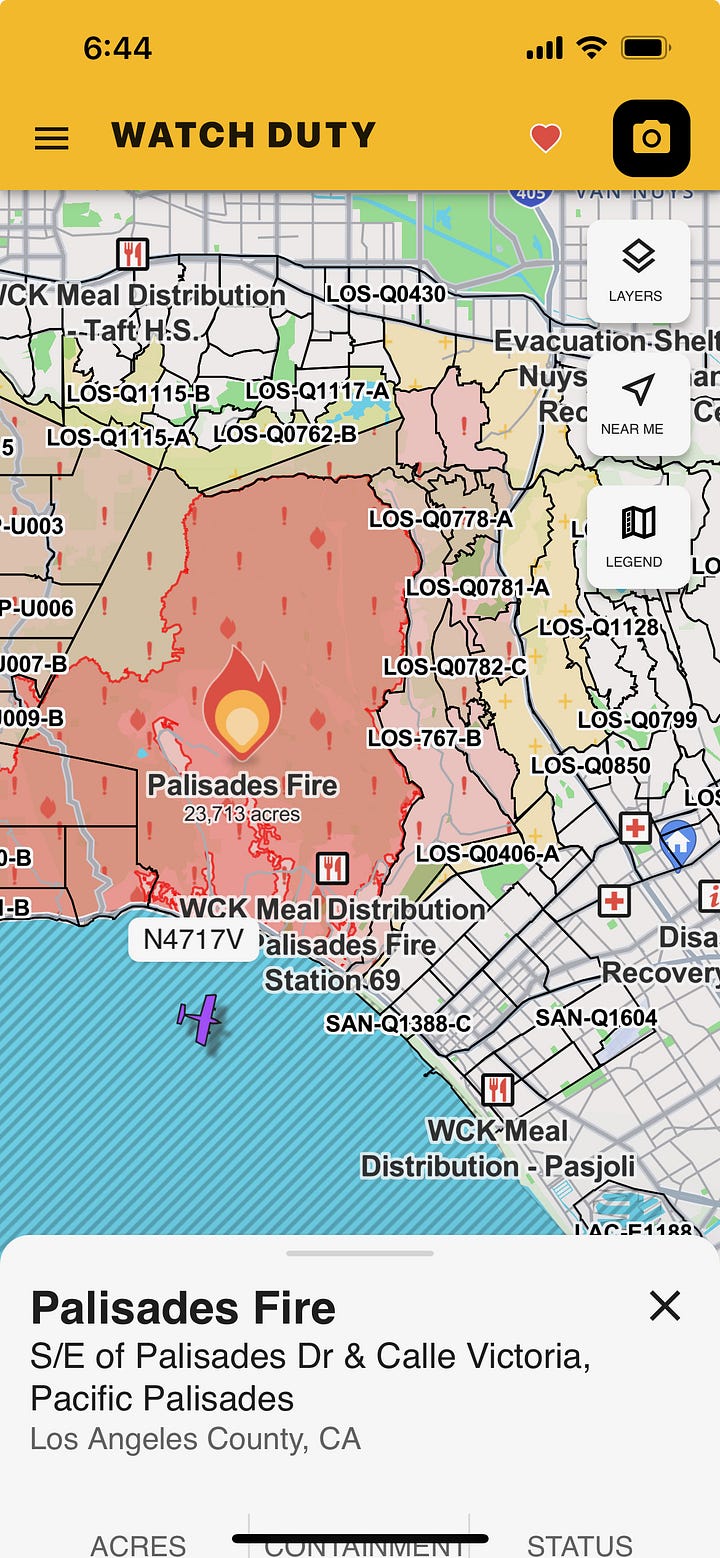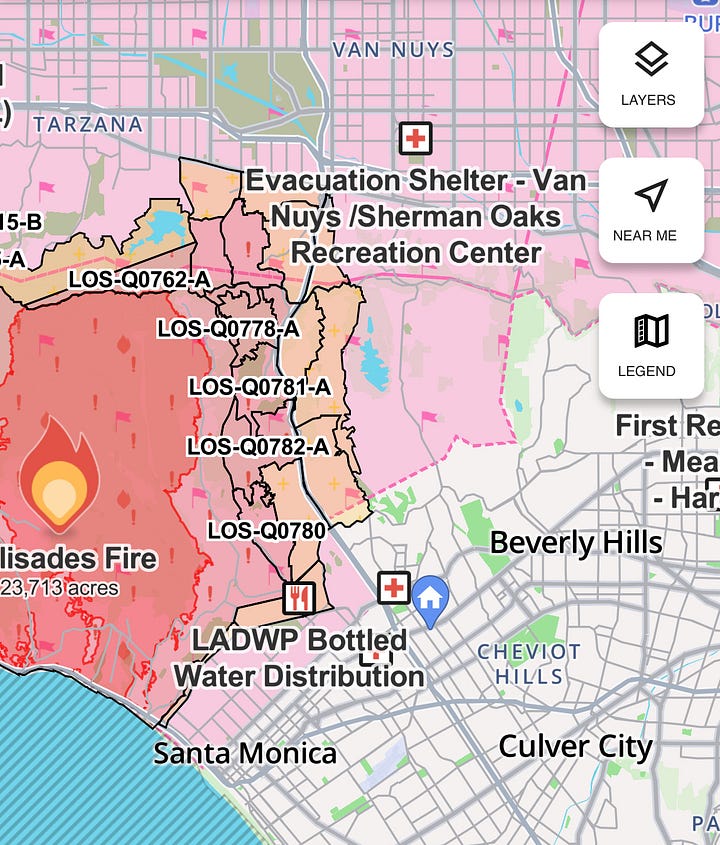Managing Generosity Takes Work
And mysterious Google algorithms don't help.
Fire update: The evacuation warning area near our home is shrinking, which is good news. Fire fighters have been able to keep the fires from spreading and the containment perimeters are growing steadily. The immediate high-wind danger has passed but there are predictions of more dangerous conditions starting over the weekend. The LAT continues to provide exemplary coverage, a mixture of on-the-scene and behind-the-scenes reporting, service articles, human interest stories, and investigative journalism. Here’s an article on the current situation.
Responding to the L.A. fires, my cousin Margaret, who lives in Asheville (and is an ace real estate agent there in case you’re looking!), posted some good advice on Facebook, based on what she observed in the response to the Hurricane Helene floods.
Tips for Disaster Donations:
1. Monetary donations rule. Red Cross, World Central Kitchen, local organizations. [I would add Team Rubicon, an organization of military veterans that is doing a lot of work in L.A.-vp]
In our WNC disaster, supplies were difficult to come by as roads into the area were unusable and our primary grocery warehouse was flooded. I assume it will be easier to get supplies in LA, but I don’t know.1
If you send supply donations:
1. Do NOT send used clothing or blankets. It goes directly in the trash and costs volunteers precious time.
2. Send cases of whatever you donate. Don't just clean out your pantry. Imagine the volunteers sorting thousands of individual boxes, cans and jars of whatever item. Label the cases. Do NOT send expired items - these also go directly in the trash.
3. Send brand name foods. Nobody wants the cheap no-name stuff. People going through a disaster deserve better!
4. Contact organizations to find out what they need. Do not assume you know. Surplus items are a storage problem. Need can change daily or hourly!
This frequently updated spreadsheet of local organizations’ needs for volunteers and donations gives some idea of the scope of generosity in the L.A. area. There are literally millions of people looking for ways to help. Note how many volunteers are needed to sort donations! As much as they’re needed and appreciated, dealing with donations—and with people’s general inclination to help—takes work. Donated items may not come with price tags but they still exact a cost, especially if you want to get the most out of the help offered.
Which brings me to my Google story.

Among the people who lost everything to the fires in Pacific Palisades and Altadena are members of the Southern California Handweavers Guild, of which I’m president. After a couple of days of exchanges on our email forum, we realized that we needed a more systematic way of matching would-be donors of weaving-related items with people who needed them. The forum thread was already getting confusing and it wouldn’t work over the long haul. Plus, we were hearing not only from members who wanted to help other members but from fiber-arts groups as far away as the Texas and the MidAtlantic region and at least one individual weaver from out-of-state.
Over the past few days, a few board members worked to create a system for members to offer weaving-related items (looms, equipment, yarn, and books/periodicals) to those who’ve lost theirs to the fires. The core element is a spreadsheet which is linked from a members-only part of our website and maintained by three people. Guild members or others can list available items by emailing the committee at a dedicated email address and they’ll post descriptions, contact info, where the item was, delivery availability, etc., on the spreadsheet. It’s a simple idea but required a lot of fine-tuning. Late last night, it was ready to go, and today I was going to write an email blast to our list, including information on the donations system and some other fire-related support.
But when I went to the spreadsheet link it was blocked for allegedly violating Google’s ToS. Why the algorithmic alarms went off was completely baffling. The spreadsheet didn’t consume much memory, it didn’t ask for money, it contained nothing illegal or controversial, and it listed no private information beyond email addresses provided by donors. Yet Google’s bots had made all our work vanish and, of course, there was no human being to contact for help or information. Having essential tools suddenly disappear is not what you want in an already stressful situation.
Making matters more complicated, the “owner” of the sheet was traveling. We had been pushing to get everything done before she left. The irony is that we started with an Excel spreadsheet and switched to Google because we thought it would be easier to coordinate updates.
Eventually, the spreadsheet owner arrived at her destination, saw our emails about the problem, logged on to the Google sheet, and had no idea what we were talking about. As mysteriously as it had vanished, the spreadsheet had reappeared! A happy ending, but from now on we’ll be regularly downloading Excel backups just in case.


But wait…there’s more
Faster, please! James Pethokoukis interviewed me on his podcast. Transcript and audio at the link.
I would absolutely go on one of these kojo yakei (“factory night view”) cruises in Japan. Industrial glamour at its finest. Related: Glamorous factory photos from Japan
Speaking of weird versions of glamour, here’s a post on “Glamour During the First Antarctic Night,” which mentions me:
The Beauty Contest was Roald Amundsen’s idea for cheering up the officers. Remember, polar exploration at the time was a male preserve. No women were present in Antarctica.
Amundsen proposed that the officers go through 500 journal illustrations of women in the ship’s library, and vote on which woman was the most beautiful of all. Of course, Belle Époque illustrations would show well-known dancers and actresses on the public scene. The officers accepted the challenge, and knew, for a brief moment, that mixture of projection, longing and fantasy described above by Virginia Postrel.
Pictures of a couple of favorite lovelies at the link.
The Verge reports on Watch Duty, whose sudden prominence in our lives can only be compared to Zoom’s rise during the pandemic.
Tech journalist and author Ashlee Vance has a new Substack publication with the wonderful name Core Memory, after the woven computer memory used before silicon chips.
Interesting thread on fire history here: “Until the 1960s, much of Santa Monica Mountains was still ranched, including what is now Topanga State Park that surrounds Pacific Palisades. Ranching is an active land use where grazing animals consume fine fuels and reduce shrub growth. That stopped when the SMMNRA and Topanga SP were established….This is not a forest. You can't just rake the leaves. It's a shrubland that used to be a lot more grassland when it was burned by the original Indigenous people and grazed during the ranching era….Why am I making this point? Because as usual, the discussion over "letting people live in high fire risk areas" has begun. It's my job to point out that people have lived here for millennia, and because they knew the fire risk, they managed the fuel. Limited fuel = limited fire.” See the whole thread here.
John Cochrane publishes the receipts, collected by Penn economist Jesús Fernández-Villaverde, showing just how nuts for central economic planning respectable people were as late as the mid-1970s. (That green link color hurts my eyes!)
It’s easy. L.A. is huge and the vast unaffected areas are full of well-supplied stores.



I am a little surprised that volunteers are that picky about items sent to help. I eat foods that are officially expired, so long as it's not by too much, because most of them are perfectly fine. Brand names only? Seriously? I never buy a brand name if an equally good (and they usually are) non-brand name item is available.
Good post.
(1) Is the Red Cross really trustworthy? I have some memory of them paying gigantic salaries and making lots of money off of blood sales. Maybe they are, and I am wrong. But a lot of charities will use a natural disaster to make money, or to collect money for LA Fires and then use it for DEI programs in Venezuela.
(2) It sounds like your website problem was with Google Docs. Is that right? Google wouldn't have access to a blog, would it? This is important because a lot of people do use Google Docs as a free way to do *.docx and *.xlsx files and cooperative work, and it seems highly risky to me. Google probably legally owns everything you put up there and has the right to look at it, sell it, and delete it. And they probably have no duty to help if they accidentally erase something, and provide no backup, which is a more realistic danger for folks who don't irritate The Regime. Or am I wrong?